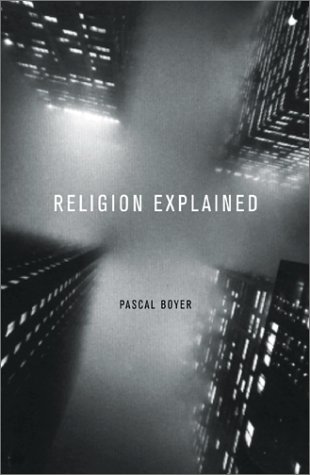 Thunder, earthquakes, droughts, a good harvest, the movements of the sun, moon, planets — we know that ancient people had hosts of myths to explain how all of these things “worked”. It is easy to assume that religious ideas were developed out of primitive attempts to explain these sorts of natural phenomena.
Thunder, earthquakes, droughts, a good harvest, the movements of the sun, moon, planets — we know that ancient people had hosts of myths to explain how all of these things “worked”. It is easy to assume that religious ideas were developed out of primitive attempts to explain these sorts of natural phenomena.
Then there are dreams, and feelings that our beloved deceased are somehow still with us, hallucinations, “bad vibes” . . . These surely puzzled our pre-scientific ancestors. Was it a need to understand these mental phenomena that led to a belief in spirits as an explanation?
Where did everything ultimately come from? Musical instruments? Metal working? Mountains? The sky? Did religion arise by deciding a God or ancestral hero was “the first cause” of all these things?
What about illness? Premature death? A flood sweeping one’s village away? Surely it is only “natural” to want to understand why evil, why suffering. Was religion developed as an explanation for these calamities? Did religion create the ideas of devils, fate, God, to explain all of this?
Pascal Boyer argues that there is something wrong with the above assumptions that religions arose to explain the mysteries of the world and life. He writes:
Now anthropologists have shown that
(i) explaining such general facts is not equally pressing in all cultures and that
(ii) the explanations provided by religion are not at all like ordinary explanations.
Not seeking to explain evil, but a particular evil

Take the case of explaining evil and misfortune in the world. In an earlier post I referred to the classic anthropological study by E. E. Evans-Pritchard of the Zande people in the Sudan. They had no interest in explaining evil in general. They had no interest in what to us was the obvious explanation of why the roof of a hut collapsed. They could all see very well that termites had eroded the supporting structures. They knew very well that termites will cause the timber to give way and collapse at some point. But that wasn’t the answer to what they wanted to know.
They were not interested in asking why the roof collapsed. They wanted to know why the roof had collapsed at that particular moment with certain persons beneath it.
There is no curiosity over the origins of evil in general. The obvious explanation does not interest them.
What they wanted to know was why the persons beneath the roof had such powerful enemies and why witchcraft was being used against them.
What they wanted to know was why certain enemies had it in for these hapless victims of the collapsed roof. The explanation they sought was for a particular instance. They wanted to know why assumed spirits were acting in a certain way.
Not seeking to explain origins in general, but particular disruptions
A similar interesting point is made with what we take to be myths of origins.
The origin of things in general is not always the obvious source of puzzlement that we may imagine. As anthropologist Roger Keesing points out in describing myths of the Kwaio people in the Solomon Islands: “Ultimate human origins are not viewed as problematic. [The myths] assume a world where humans gave feasts, raised pigs, grew taro, and fought blood feuds.” What matters to people are particular cases in which these activities are disrupted, often by the ancestors or by witchcraft.
The unlikely explanations of myths
 Recall that “the explanations provided by religion are not at all like ordinary explanations.” Recall the complete lack of interest in termites being the explanation for the collapse of the roof. Take the explanation of thunder as an example:
Recall that “the explanations provided by religion are not at all like ordinary explanations.” Recall the complete lack of interest in termites being the explanation for the collapse of the roof. Take the explanation of thunder as an example:
The explanations one finds in religion are often more puzzling than illuminating. Consider the explanation of thunderstorms as the booming voice of ancestors venting their anger at some human misdemeanor. To explain a limited aspect of the natural world (loud, rolling, thumping sounds during storms), we have to assume a whole imaginary world with superhuman agents (Where did they come from? Where are they?) that cannot be seen (Why not?), in a distant place that cannot be reached (How does the noise come through all the way?), whose voices produce thunder (How is that possible? Do they have a special mouth? Are they gigantic?). Obviously, if you live in a place where this kind of belief is widespread, people may have an answer to all these questions. But each answer requires a specific narrative, which more often than not presents us with yet more superhuman agents or extraordinary occurrences—that is, with more questions to answer.
Boyer then cites another case study, this time of an attempt to cure a mentally disturbed person:
As another illustration, here is a short account of shamanistic ritual among the Cuna of Panama by anthropologist Carlo Severi:
The [shaman’s] song is chanted in front of two rows of statuettes facing each other, beside the hammock where the patient is lying. These auxiliary spirits drink up the smoke whose intoxicating effect opens their minds to the invisible aspect of reality and gives them the power to heal. In this way [the statuettes] are believed to become themselves diviners.
That short passage introduces loads of problems for the “religion is an attempt to explain stuff” model. I’ll quote Boyer’s own commentary:
The patient in this ritual has been identified by the community as mentally disturbed, which is explained in religious terms. The soul of the person was taken away by evil spirits and it is now held hostage. A shaman is a specialist who can enlist auxiliary spirits to help him deliver the imprisoned soul and thereby restore the patient’s health. Note that this goes well beyond a straightforward explanation for aberrant behavior. True, there is direct evidence of the patient’s condition; but the evil spirits, the auxiliary spirits, the shaman’s ability to journey through the spirits’ world, the efficacy of the shaman’s songs in his negotiation with the evil spirits—all this has to be postulated. To add to these baroque complications, the auxiliary spirits are in fact wood statuettes; these objects not only hear and understand the shaman, but they actually become diviners for the time of the ritual, perceiving what ordinary people cannot see.
He continues, but I add my own emphasis:
An “explanation” like that does not work in the same way as our ordinary accounts of events in our environment. We routinely produce explanations that (i) use the information available and (ii) rearrange it in a way that yields a more satisfactory view of what happened. Explaining something does not consist in producing one thought after another in a freewheeling sort of way. The point of an explanation is to provide a context that makes a phenomenon less surprising than before and more in agreement with the general order of things. Religious explanations often seem to work the other way around, producing more complication instead of less. As anthropologist Dan Sperber points out, religion creates “relevant mysteries” rather than simple accounts of events.

So it might be said, I suppose, that rather than seeking an explanation for a mystery, religion compounds mysteries with more complex mysteries.
Are we to conclude that the people who devised religions did not know what a proper explanation is?
But that is absurd. We have ample evidence that they do know. People use the ordinary “getting most of the relevant facts under a simpler heading” strategy all the time. So what people do with their religious concepts is not so much explain the universe as … well, this is where we need to step back and consider in more general terms what makes mysteries relevant.
And on that cliff edge is where I’ll pause for a break, too. I’ll pick up this series again in a day or two, maybe three.
If you enjoyed this post, please consider donating to Vridar. Thanks!

“We tell stories in order to live,” Joan Didion wrote. Human beings are storytellers by nature. It is one of our first instincts. If a small child is peppering its parent with questions which the parent can’t answer, or won’t attempt to answer (because she knows the child will never undertand the explanation) the parent will make up a story to placate the child. And the child will be happy with it. Thus, we have stories about storks bringing babies, etc. I’m sure religious explanations of things like thunder or collapsed roofs have the same or similar origin. Even many adults cannot live with the uncertainty of not knowing things we can never know, or can never seem to face, such as the fact of our own deaths. Thus, they will accept, or pretend to accept, a story that has no relationship to anything in the world of their daily observation, except in poetic or emotional analyses. They thus become subject to mystery. Once they are subject to any such phenomenon as mystery, there are always those ready and willing to use this power for their own benefit, or (in benign cases) for the general welfare. That is your priestly class.
This inspires thoughts in two different directions for me. First is “no Marx?” Marx of course insisted long ago, and quite bluntly, that religion was fundamentally a matter of mystification, but that the point of the mystification was not just to “explain” but to pacify – that is, not merely to offer a “cause” for apparently permanent misery and oppression, but to make it appear as humanly bearable for the victims. Heaven is unreal, but so long as it appears real, it represents an alternative to fighting for better in this world; thus “the abolition of religion as the illusory happiness of the people is the demand for their real happiness.” Controversial? Sure. Simplistic? Maybe. But certainly worth the mention as a historically important attempt to grapple with the question.
Second and less directly is Thomas Kuhn and his theory of the scientific “paradigm”. As you quote Boyer: “True, there is direct evidence of the patient’s condition; but the evil spirits, the auxiliary spirits, the shaman’s ability to journey through the spirits’ world, the efficacy of the shaman’s songs in his negotiation with the evil spirits—all this has to be postulated.” This all might appear as multiplying entities without necessity, and thereby adding to the mystery, but is it so different from, say, the postulation of invisible subatomic particles and forces of nature governing their interactions? One thing that reading Kuhn’s famous book on The Structure of Scientific Revolutions really illuminated for me is the way scientific paradigms really are works of the imagination, not self-evident phenomena visible to the naked eye. The scientist’s act of postulating what sorts of things exist and how they relate to each other is not carried out in a vacuum, but goes hand in hand with the design of experiments, the apparatus used, the types of observations and measurements that can be conceived of and then executed, etc. For Kuhn this understanding meant an increased appreciation for pre-modern scientists; their paradigms might be considered unacceptable and false today, but they were not different in kind from our modern ones, and in fact were not unreasonable given the materials available to them.
More Kuhn: scientific explanations of course seek to unify, to produce principles that summarize a wide array of observations. But no theory is perfect, all contain anomalies which seem inevitably to multiply as time passes, and the theories naturally become more and more elaborate and complex to account for exceptional observations – until a “revolution” sweeps them away through the introduction of a new paradigm. Might what seem to be unnecessarily elaborate features of a “religious” worldview merely represent many years worth of accumulated complexity within a highly developed and thoroughly elaborated paradigm? Modern “scientific” explanations for the same phenomena may be better, but who on earth can say with a straight face that they are simpler?
(Kuhn himself took this to the limit by insisting that the choice of paradigm was, in a very real sense, indeterminate and not dictated by “logic”; particularly for early adopters of a new paradigm whose kinks have not been worked out, the choice may be little more than an aesthetic one: a preference for a more “elegant” explanation for certain phenomena of subjective interest, with the gaps to be filled in later. One might even say that without this subjective side revolutions could not take place, as there would be no motivation to ever seek alternative explanations in the first place.)
Pardon me for intruding, dn, but it almost sounds as if you want to compare scientific paradigm with religion. You have not actually done so, of course. But the simplicity and the complication, etc., I feel an implied comparison there perhaps. (?)
This seems to be a red herring. Perhaps that’s too strong and I don’t want to cause a quarrel. It seems to miss the point perhaps?
I think everything argued is correct, but why did they posit witches existing with causative powers in the first place, to use one example? If not to explain?
Same with souls and spirits. It may confuse now when they invoke greater mystery, but that seems just to be a case that any theory can be altered, made more complex in the face of contradictory evidence. As with Christians moving god further and further from the action to become a god of the gaps so as to preserve god as part of their system of beliefs and explanations.
As you say there is no curiosity of evil in general as it is taken to already be explained. It’s just a matter of what these capricious forces are up to and how to propitiate them now.
It seems to me, then, that they were offered as explanations are a now taken to be part of the explanatory fabric of their believers universe.
Will cover Boyer’s answer in a future post.